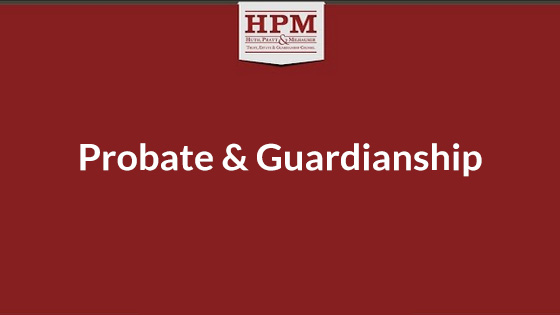Probate and Guardianship
Probate
Probate is the court process for administering the estate of a decedent. An estate consists of assets that were owned individually at the time of death. Assets that are owned jointly or assets that pass by beneficiary designation do not pass through probate.
At Huth, Pratt & Milhauser, we assist families and those nominated to represent an estate (a Personal Representative) through the probate process. The process can be complicated, time consuming and stressful due to the laws in place that are designed to protect family members, creditors and beneficiaries of the decedent.
We will represent a Personal Representative in collecting and preserving the estate assets, dealing with creditors, publishing notice to creditors, advising about proper tax reporting and ultimately making distributions to the beneficiaries.
Trust Administration
If a decedent had a trust at the time of death, the Trustee must act in accordance with the terms of the trust and in compliance with the law. Although court intervention may not be necessary, the trust must still be administered properly.
We represent Trustees in advising them of their fiduciary duties to beneficiaries of the trust and potential creditors. Responsibilities of the Trustee include inventorying assets, preparing trust accountings, reporting to the beneficiaries, filing and paying applicable taxes and distributing assets to the beneficiaries in accordance with the Trust instrument.
We are happy to assist a Trustee in his or her fiduciary capacity or even represent beneficiaries to enforce their rights under the Trust and under the law.
Guardianship Attorney
We represent Guardians and wards through the court process called Guardianship. A Guardianship is necessary to deal with the person or property of an individual who is declared incapacitated by a court such as a minor or a person who cannot make his or her own decisions.
A Guardian has very serious responsibilities which are closely monitored by a court. We represent Guardians in carrying out their fiduciary duties and caring for the ward. We assist in the decision-making process in terms of health care actions on the ward’s behalf or handling the ward’s property.
Further, we assist in reporting the Guardian’s actions to the court and obtaining court approval for all actions, as needed.
Probate & Guardianship videos
- Does all property have to go through probate when a person dies?
- How do you prove a will?
- Should I avoid probate?
- Under what circumstances can an adopted child inherit if there is no will?
- What are fiduciary duties?
- What are probate assets?
- What are the statutory rights of a surviving spouse in Florida?
- What are the steps involved in probate?
- What happens if I die without a will?
- What happens if you do not have a will or trust?
- What is an elective share for a widow or widower in Florida?
- What is probate?
- What rights do the surviving children have in the probate estate?
- What rights does the surviving spouse have in the probate estate?
- Why, if at all, must an estate or assets be probated?
- How is a guardianship proceeding initiated?
- What are the disadvantages and advantages of a guardianship?
- What are the various types of guardians?
- What if another person filed for guardianship over a loved one and I disagree with having…
- What if I think that the guardian is doing something wrong?
- What is a guardianship?
- What is the difference between a guardian of the person and a guardian of the property?
- When is a guardianship necessary?
- Who keeps track of what the guardian is doing?
- Can I use my will to name a guardian to care for my young children and manage their property?



